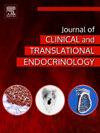儿童的饮食习惯和类胡萝卜素表皮含量与他们在学校就餐的情况有关:横断面试点研究
IF 3.3
Q1 ENDOCRINOLOGY & METABOLISM
Journal of Clinical and Translational Endocrinology
Pub Date : 2024-11-23
DOI:10.1016/j.jcte.2024.100378
引用次数: 0
摘要
目的 在儿童时期推广健康饮食,如地中海饮食(Mediterranean Diet,MD),具有特别重要的意义,因为在生命早期学会的饮食行为已被证明可以保持到青春期和成年期。这项研究的目的是评估儿童对地中海饮食模式的坚持情况以及皮肤类胡萝卜素水平,并根据他们在学校吃午餐的情况进行划分。方法这项横断面研究涉及 132 名学生(64 名女孩和 68 名男孩),分为在学校吃午餐的儿童(44%)和在家吃午餐的儿童(56%)。在学校用餐的儿童参加了宣传水果和蔬菜对健康益处的活动。所有参与者都接受了人体测量,并分别使用 KIDMED 和 PAQ-C 问卷对坚持 MD 和体育锻炼情况进行了评估,还使用 Veggie Meter® 对皮肤类胡萝卜素含量进行了评估。有趣的是,与在家吃午餐的儿童相比,吃学校提供的午餐的儿童类胡萝卜素得分明显更高(p = 0.005)。在多元回归分析中,我们发现类胡萝卜素得分受性别(p = 0.03)、学校午餐就餐率(p = 0.01)和每日蔬菜摄入量(p = 0.0002)的积极影响。本文章由计算机程序翻译,如有差异,请以英文原文为准。
Eating habits and carotenoid skin content among children based on their attendance at the school meals: A cross-sectional pilot study
Objective
The promotion of a healthy diet, such as the Mediterranean Diet (MD), among childhood is of a particular importance, since eating behaviors learned early in life have been shown to be maintained into adolescence and adulthood. The most efficient intervention in childhood is the active involvement of the schools.
Design
The aim of this study was to evaluate the adherence to the MD model and the skin carotenoid levels among children divided by their school lunch attendance.
Methods
This cross-sectional study involved 132 pupils (64 girls and 68 boys), divided between children who ate lunch at school (44%) and at home (56%). The children who had meals provided by the school participated in activities promoting the health benefits of fruits and vegetables. All participants underwent anthropometric measurements and assessment of the MD adherence and the physical activity using KIDMED and PAQ-C questionnaires, respectively, and skin carotenoid content using the Veggie Meter®.
Results
We found mean KIDMED and PAQ-C scores, while skin carotenoid content was below the normal range in our population sample. Interestingly, children who ate lunch provided by the school had significantly higher carotenoid scores with respect to those who had lunch at home (p = 0.005). In multiple regression analyses, we found that carotenoid scores were positively influenced by gender (p = 0.03), school lunch attendance (p = 0.01) and daily vegetable consumption (p = 0.0002) in our children population sample.
Conclusions
Our results suggest the importance of promoting a healthy lifestyle at the school to improve eating habits during childhood as a strategy for disease prevention across the lifespan.
求助全文
通过发布文献求助,成功后即可免费获取论文全文。
去求助
来源期刊

Journal of Clinical and Translational Endocrinology
ENDOCRINOLOGY & METABOLISM-
CiteScore
6.10
自引率
0.00%
发文量
24
审稿时长
16 weeks
 求助内容:
求助内容: 应助结果提醒方式:
应助结果提醒方式:


